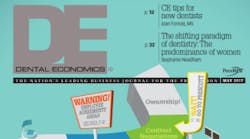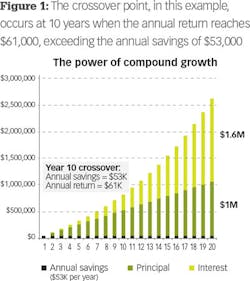Financial freedom: Harness the power of compound growth
Want to achieve financial freedom? The first step, according to Michael McAninch, CPA, CFP, is to pay yourself first—that is, save your money wisely to harness the power of compound growth.
When I work with dentists, they often tell me that achieving financial freedom is their most important goal. But for most dental professionals, the reality is that they have never determined what financial freedom means to them, nor have they developed plans to achieve it.
For most, financial freedom means accumulating sufficient assets and having confidence that you can maintain your desired lifestyle throughout retirement while preserving your legacy goals. To achieve financial freedom, consider these three questions: How much do I need? How do I get there? And what strategies can guide the process?
The answers to these questions may be similar for all dentists, but your individual wants and needs should certainly drive your answers. The third question is where having a trusted advisor can help ensure that you’re on the right course to financial freedom. Without a comprehensive strategy that takes into consideration your unique situation as a practicing dental professional, you run the risk of making haphazard and foolish choices that could threaten your financial well-being.
The first step in a comprehensive strategy? Pay yourself first. Elementary, I know. But surprisingly few people take advantage of this foundational financial rule. As a business owner, you know the demands your business can place on your available cash flow. Dentists who have achieved financial freedom likely found a way to start saving very early in their professional lives. The key factor in creating wealth is time: the more time you have to save, the more your savings may increase due to the power of compound growth. Over time, as your savings earn interest, that interest also begins to earn interest and so on.
Consider the following example: $53,000 saved per year at an 8% annualized rate of return will grow to $335,804 in five years, $829,211 in 10 years, $1,554,187 in 15 years, $2,619,415 in 20 years, $4,184,584 in 25 years, and $6,484,331 in 30 years. As you can see, compound growth is powerful—and it pays to start early.
Let’s look at another example: Joe saves $3,000 per year from age 19 to age 28 and allows that investment to grow at an 8% rate until he retires at age 65 with a total savings of $809,449. Alternatively, if Joe saves $3,000 per year starting at age 29 until he is 38 (which is still 10 years of saving), he would have only $657,984 when he retires.
The real power of compound growth comes into play when your savings reach the “crossover point,” which is when annual earnings equal annual savings. Figure 1 illustrates the growth of annual savings of $53,000 over 20 years. Note the crossover point is at 10 years.
Saving income into a qualified retirement plan, starting at the youngest age possible, can reward dentists with the power of compounding growth over a lifetime. The longer that recurring deposits can be invested in a diversified portfolio, particularly when savings are pretax and grow tax-deferred over decades, the greater the likelihood that basic strategy will drive your financial success.
Michael McAninch, CPA, CFP, is a practice integration advisor at Buckingham Strategic Wealth, a wealth management firm with a niche practice area focusing on financial solutions for dentists and their families. Buckingham is a member of the BAM Alliance, a community of more than 140 independent firms across the United States. To learn more and find an advisor near you, visit thebamalliance.com or contact Buckingham at (888) 470-3064.

